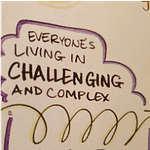In what has been a tumultuous year for businesses, keeping employee values and culture alignment front and centre has never been more crucial. The Achievers’ Workforce Institute – the company’s research and science arm – set out to answer a specific question: How have companies addressed the effect of the COVID-19 pandemic on their people and culture?
The Workforce Institute surveyed more than 1,000 employees on the alignment between their values and those of their organisation. The findings demonstrate that the pandemic affected culture alignment, and mostly in a negative way.
The COVID-19 pandemic changed culture alignment
We asked senior leaders to compare the alignment of their core business processes before and during the COVID-19 outbreak. We discovered that many processes – strategic planning, professional development and budgetary decisions had become less aligned. The one area that showed significantly greater alignment was work flexibility, which is probably due to the sudden need to allow working from home for a wide variety of roles.
Values alignment is the main predictor of engagement
Our research also revealed that respondents whose personal values aligned very closely with those of their company were five times more likely to describe themselves as engaged than those who were not aligned. This was a statistically significant finding. In fact, engagement correlated so strongly with values alignment that we found values alignment was the best overall predictor of engagement. 59% of those whose values are not at all aligned reported being disengaged, compared to just 2% of those who were very well aligned.
Employees in the post-COVID world want recognition above all else
More than a third (35%) of those surveyed said they wanted more recognition when asked how organisations could better support them through the COVID-19 pandemic. This was particularly applicable to senior respondents, such as directors (53%) and senior managers (42%). Managers were the most likely to ask for a better work-life balance, with 45% choosing this option.
There is still a clear correlation between recognition and engagement
While the pandemic has changed culture alignment, recognition is still closely tied to engagement. The more recently an employee had received recognition, the more likely they were to be engaged. Almost half of those who had been recognised in the last week said they were very engaged, but this dropped to less than a third when considering recognition received in the last month. Among those recognised more than a year ago, the figure was only 16%.
The importance of culture continuity
Culture continuity describes how well an organisation maintains its culture alignment, regardless of internal and external upheaval. So far, most organisations have struggled to effectively maintain culture continuity during the pandemic. Work-life balance and wellbeing were commonly reported issues. On a more positive note, work flexibility and manager contact were picked out as shining beacons among the gloom.
Our research provides senior managers with a clear message: culture continuity is business critical. Organisations that fail to align every business process with their values are missing out on a golden opportunity to improve decision-making, recruit more effectively and increase employee engagement.
Author Bio: Jon Maddison, Managing Director EMEA at Achievers that recently launched the culture continuity report.
Photo credit: Bill Oxford on Unsplash




